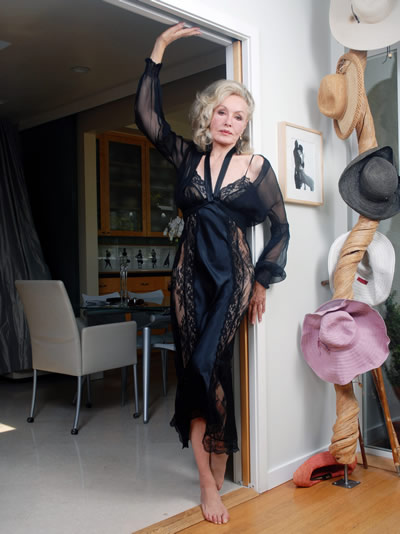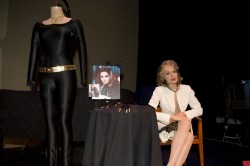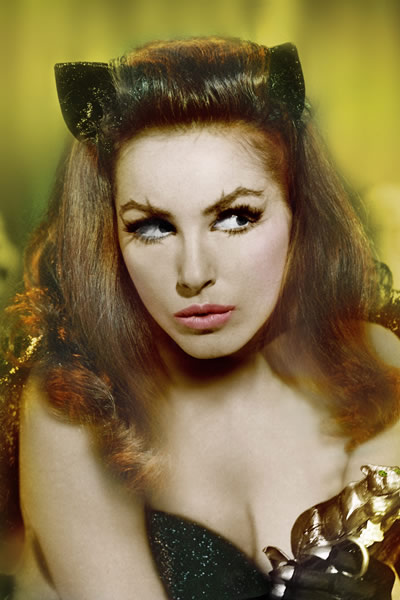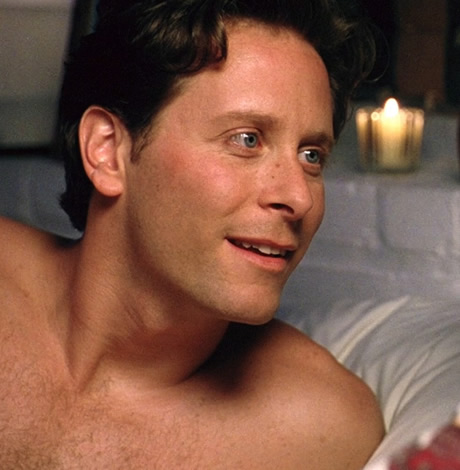Arts & Entertainment
Catching up with Catwoman
Actress Julie Newmar on camp, ‘Batman,’ advice for living and ‘To Wong Foo’


Actress Julie Newmar has discovered a passion for writing. Her advice book ‘The Conscious Catwoman’ is out now. She plans future books on gardening and childhood celebrity crushes. (Photo by Alan Mercer; courtesy Julie Newmar)
‘The Conscious Catwoman Explains Life on Earth’
By Julie Newmar
Eleven Books
75 pages
$18.95
julienewmarwrites.com
Fall’s a busy time and things only seem to accelerate as the year winds down and the holidays loom. So I’m taking care of some regretfully unfinished 2011 business.
Last September I spent a purrrrfectly — OK, sorry, couldn’t resist — delightful hour on the phone with Julie Newmar from her Los Angeles home about two miles from Brentwood. Everybody remembers her as Catwoman on the campy ‘60s TV show “Batman,” but serious fans know she’s also a Tony-winning actress who’s had triumphs on both stage and screen (both TV and film).
Unlike some actors who only begrudgingly acknowledge or discuss roles that, for whatever reason, got etched into the pop culture collective consciousness to a disproportionate degree, Newmar is happy to talk “Batman” and even called her 2011 book “The Conscious Catwoman Explains Life on Earth.”
It’s a 75-page wonder you think you’ll be able to plow through in an hour but it’s sneaky that way — I found myself spending an hour on each page, pondering the pearls of wisdom she shares. It’s also liberally peppered with eye-popping images of Newmar throughout her career as well as a playful series of mime-inspired photos that show the 78-year-old actress’s playful side.
Newmar says she’s always been a fan of how-to books and decided she’d lived enough life to share some tips. Most are hers but others she includes are from everything from the Bible to Voltaire to Carl Jung.
“I think after the age of 50 you start wondering why you became what you did and you start thinking about your life, what worked, what’s different,” she says. “I’ve always been in love with these how to books since I was in my teens. How to look better, how to not be frightened speaking in public or whatever … I’d had the idea for awhile but it takes time to do it the right way, so I took my time with it.”
Among her insights:
- Don’t try to be like others; you’ll not only be sorry, you’ll soon be out of fashion and the shallowness, the telltale marks of your insecurity, will show.
- You can bury a lot of troubles digging in the dirt (Newmar is an avid gardener)
- Life works once you get to be more in a state of gratitude than supplication or neediness.
- The important thing is to ask the right question — never mind the answer, it will drop in your lap.
- I hide my annoyance when people tell me, “But you can wear anything.” Anything is what I don’t wear.
- Every professions has its scullery duty.
“I love one liners,” she says. “Something you can peel off and put on the fridge or in the car. If you’re wanting to do better in life, you sort of collect these things over time and they stay with you. I think you cull your own garden in the sense there’s this assimilation of wisdom that takes place and can be very healing … you have to learn to love yourself as your maker does.”
Newmar happily answers any question I throw at her.
She says she “never ever” has felt frustrated by being so widely known as Catwoman, a recurring role she played in 12 episodes during the series’ first two seasons in 1966 and ’67. The famous body-hugging Lurex costume — reportedly made by Newmar herself — is now on display at the Smithsonian.
“It’s the first part of your house,” she says. “I’m lucky, fortunate and totally lucky to have something in my house that people know. Then you can invite them in and share the rest. I always look at the work as beneficial.”
And what of stars who reject their trademark roles or feel limited or typecast by them?
“It’s sad,” Newmar says. “It should always be seen as an opportunity. Strong people know how to take the negative and make it work for them, like making lemonade. I always like to look at things that way.”
Newmar attributes the character’s longevity to her bevy of traits.
“She’s very bright, savvy, smart. She wears high, daunting heels. She looks good from the front and back. She’s got a cute ass. She’s fun to play with. Naughty.”
The actress didn’t grow up with cats. Her mother had a wire-haired Terrier named William Powell (named after the “Thin Man” actor) but during the time she played the part, Newmar adopted two cats from actress June Havoc and observed their behavior.
“I’d wander over and watch them eat and play and frolic around. You do your homework.”
And how intentional was the camp quotient at the time? Were the actors encouraged to ham it up?
“It doesn’t matter what it looks or sounds like, whether it’s camp, straight or this, that or the other,” she says. “You still have to find the truth in it. You play the truth, then the rhythm seeps in and you go with it.”
Newmar, who introduced the part, had other projects brewing at the time so she didn’t feel especially connected to the role until later. Former Miss America winner Lee Meriwether played Catwoman in a 1966 film version that starred most of the TV series cast, but then Newmar was back in the role for the show’s second season. And in a performance perhaps as indelible as Newmar’s, the late Eartha Kitt played the character in the third and final season. Newmar, who was photographed for USA Today with Meriwether and Kitt in 2004 around the time the Halle Berry movie came out, says she “loved” Kitt in the part and owned several of Kitt’s albums at the time. She says Michelle Pfeiffer had the best Catwoman costume, but says the Berry film “didn’t quite come together.” She’s “100 percent” supportive of Anne Hathaway in the latest version, “The Dark Knight Rises,” slated for a July release.

Newmar as one of nine 'Legendary Ladies of Stage & Screen' during a Smithsonian presentation of her famous catsuit in 2008. (Photo courtesy Harlan Boll)
“I think our show worked because, well, color was pretty new on TV at the time and it just seemed to sit really well within the confines of a television screen. The excesses of it, the booms and bams, it just fit so very well and you could just imagine the little kids sitting there on the floor with their eyes wide open. The color really popped. I really think that was a big part of it — they made extraordinary use of the color. I’d just done ‘My Living Doll,’ but that was in black and white. This became far more popular.”
Newmar is a bit taken aback when I ask if her hair being longer in the second season — it went from a flip to a much longer, past-the-shoulders look in the later episodes — is intentional. She says no significant thought was put into it — just a reflection of the changing styles. The initial look, sort of vaguely Jackie inspired, was a sign of the times. Longer hair was more popular in the late ’60s. Newmar remembers doing her own makeup — “nothing terrifically trend setting,” she notes — on the show. “Nobody ever asked me that before,” she says.
Of her dozens of television guest appearances, she says her famous “Twilight Zone” episode (she played the devil in the season four episode “Of Late I Think of Cliffordville”) is especially memorable. She met creator/writer/host Rod Serling during the filming and remembers his trademark cigarette smoking and “oh, that brilliant mind — that marvelous, marvelous man. Aren’t we grateful that we have this and that they kept these films? I remember shooting in this small little theater on 44th Street under the New York Times. It was all about story on that show.”
She also remembers her “Batman” costars fondly — she calls Adam West (Batman) “darling, a doll,” and says Burt Ward (Robin) was “perfect. He wasn’t an actor at all. He was 19 at the time and they found him in a gym.”
Newmar next plans a book about celebrity crushes. She’s widely credited — anecdotally at least — with having awoken the hormones of practically a whole generation of American straight boys on “Batman.” She considers it a paradoxical wonder that her gay appeal — they wanted to have her, we wanted to be her — is perhaps equally as strong.
And, of course, we can’t let Miss Newmar go without asking her about her eponymous drag film “To Wong Foo.” She chuckles at the memory.
Foo, it seems, was the owner of a Chinese restaurant in New York that’s no longer in business. It was near Sardi’s on 44th Street. Legend has it screenwriter Douglas Beane saw an autographed photo of Newmar there and the sheer wackiness of its inscription jumped out at him.
“He probably made it up,” Newmar says with a laugh. “I don’t remember doing it. I think he just thought if he gave it an innocuous little title it wouldn’t make it out of the stack on some producer’s desk so he gave it this crazy title. And sure enough, it did make it out of the stack.”
And one more “Batman” question — of either her show or the characters in general, is there a homoerotic subtext between Batman and Robin?
“I don’t think so,” Newmar, whose brother is gay, says first, then backpedals. “Well maybe. I think anytime something is too straight, we want to throw a snowball at it. We crave some alternate. Thank God we can have both gay and straight.”
Sports
Bisexual former umpire sues Major League Baseball for sexual harassment
Brandon Cooper claims female colleague sexually harassed him

A fired former umpire is suing Major League Baseball, claiming he was sexually harassed by a female umpire and discriminated against because of his gender and his sexual orientation.
Brandon Cooper worked in the minor league Arizona Complex League last year, and according to the lawsuit he filed Wednesday in federal court in Manhattan, he identifies as bisexual.
“I wanted my umpiring and ability to speak for itself and not to be labeled as ‘Brandon Cooper the bisexual umpire,’” he told Outsports. “I didn’t want to be labeled as something. It has been a passion of mine to simply make it to the Major Leagues.”
But that didn’t happen. Instead of being promoted, he was fired. His suit names MLB and an affiliated entity, PDL Blue, Inc., and alleges he had endured a hostile work environment and wrongful termination and/or retaliation because of gender and sexual orientation under New York State and New York City law.
“Historically the MLB has had a homogenous roster of umpires working in both the minor and major leagues,” Cooper claims in his suit. “Specifically, to date there has never been a woman who has worked in a (regular) season game played in the majors, and most umpires are still Caucasian men. To try to fix its gender and racial diversity issue, defendants have implemented an illegal diversity quota requiring that women be promoted regardless of merit.”
Cooper claims former umpire Ed Rapuano, now an umpire evaluator, and Darren Spagnardi, an umpire development supervisor, told him in January 2023 that MLB had a hiring quota, requiring that at least two women be among 10 new hires.
According to the suit, Cooper was assigned to spring training last year and was notified by the senior manager of umpire administration, Dusty Dellinger, that even though he received a high rating in June from former big league umpire Jim Reynolds, now an umpire supervisor, that women and minority candidates had to be hired first.
Cooper claims that upon learning Cooper was bisexual, fellow umpire Gina Quartararo insulted him and fellow umpire Kevin Bruno by using homophobic slurs and crude remarks. At that time, Quartararo and Cooper worked on the same umpiring crew and being evaluated for possible promotion to the big leagues.
This season, Quartararo is working as an umpire in the Florida State League, one of nine women who are working as minor league umpires.
Cooper said he notified Dellinger, but instead of taking action against Quartararo, he said MLB ordered Cooper to undergo sensitivity training. According to his lawsuit, he was also accused of violating the minor league anti-discrimination and harassment policy.
Cooper’s suit says he met with MLB Senior Vice President of Diversity, Equity and Inclusion Billy Bean — who the Los Angeles Blade reported in December is battling cancer.
The lawsuit says at that meeting, Bean told the umpire that Quartararo claimed she was the victim, as the only female umpire in the ACL. Cooper said he told Bean Quartararo regularly used homophobic slurs and at one point physically shoved him. He also claims that he has video evidence, texts and emails to prove his claim.
But he said his complaints to Major League Baseball officials were ignored. His lawsuit said MLB passed him over for the playoffs and fired him in October. He said of the 26 umpires hired with Cooper, he was the only one let go.
Through a spokesperson, MLB declined to comment on pending litigation. Quartararo has also not publicly commented on the lawsuit.
a&e features
Eastern Shore chef named James Beard Finalist
Harley Peet creates inventive food in an inclusive space

In a small Eastern Shore town filled with boutiques, galleries, and the occasional cry of waterfowl from the Chesapeake, Chef Harley Peet is most at home. In his Viennese-inflected, Maryland-sourced fine-dining destination Bas Rouge, Peet draws from his Northern Michigan upbringing, Culinary Institute of America education, and identity as a gay man, for inspiration.
And recently, Peet was named a James Beard Finalist for Best Chef: Mid-Atlantic – the first “Best Chef: Mid-Atlantic” finalist representing the Eastern Shore.
Peet, after graduation from the Culinary Institute of America, took a position as sous chef at Tilghman Island Inn, not far from Bas Rouge. Falling in love with the Eastern Shore, he continued his passion for racing sailboats, boating, gardening, and fishing, and living his somewhat pastoral life as he opened Bas Rouge in 2016 as head chef, a restaurant part of the Bluepoint Hospitality group, which runs more than a dozen concepts in and around Easton, Md.
Coming from a rural area and being gay, Peet knew he had his work cut out for him. He was always aware that the service and hospitality industry “can be down and dirty and rough.”
Now as a leader in the kitchen, he aims to “set a good example, and treat people how I want to be treated. I also want to make sure if you’re at our establishment, I’m the first to stand up and say something.”
The Bas Rouge cuisine, he says, is Contemporary European. “I’m inspired by old-world techniques of countries like Austria, Germany, and France, but I love putting a new spin on classic dishes and finding innovative ways to incorporate the bounty of local Chesapeake ingredients.”
His proudest dish: the humble-yet-elevated Wiener Schnitzel. “It is authentic to what one would expect to find in Vienna, down to the Lingonberries.” From his in-house bakery, Peet dries and grinds the housemade Kaiser-Semmel bread to use as the breadcrumbs.
Peet works to support the LGBTQ community inside and outside of the kitchen. “I love that our Bluepoint Hospitality team has created welcoming spaces where our patrons feel comfortable dining at each of our establishments. Our staff have a genuine respect for one another and work together free of judgment.”
Representing Bluepoint, Peet has participated in events like Chefs for Equality with the Human Rights Campaign, advocating for LGBTQ rights.
At Bas Rouge, Peet brings together his passion for inclusion steeped in a sustainability ethic. He sees environmental stewardship as a way of life. Peet and his husband have lived and worked on their own organic farm for several years. Through research in Europe, he learned about international marine sourcing. Witnessing the impacts of overfishing, Peet considers his own role in promoting eco-friendly practices at Bas Rouge. To that end, he ensures responsible sourcing commitments through his purveyors, relationships that have helped create significant change in how people dine in Easton.
“I have built great relationships in the community and there’s nothing better than one of our long-standing purveyors stopping in with a cooler of fresh fish from the Chesapeake Bay. This goes especially for catching and plating the invasive blue catfish species, which helps control the species’ threat to the local ecosystem.
Through his kitchen exploits, Peet expressed a unique connection to another gay icon in a rural fine-dining restaurant: Patrick O’Connell, of three Michelin starred Inn at Little Washington. In fact, Peet’s husband helped design some of O’Connell’s kitchen spaces. They’ve both been able to navigate treacherous restaurant-industry waters, and have come out triumphant and celebrated. Of O’Connell, Peet says that he “sees [his restaurants] as canvas, all artistry, he sees this as every night is a show.” But at the same time, his “judgment-free space makes him a role model.”
Being in Easton itself is not without challenges. Sourcing is a challenge, having to either fly or ship in ingredients, whereas urban restaurants have the benefit of trucking, he says. The small town “is romantic and charming,” but logistics are difficult – one of the reasons that Peet ensures his team is diverse, building in different viewpoints, and also “making things a hell of a lot more fun.”
Reflecting on challenges and finding (and creating) space on the Eastern Shore, Peet confirmed how important it was to surround himself with people who set a good example, and “if you don’t like the way something is going … move on.”

Team DC, the umbrella organization for LGBTQ-friendly sports teams and leagues in the D.C. area, held its annual Night of Champions Awards Gala on Saturday, April 20 at the Hilton National Mall. The organization gave out scholarships to area LGBTQ student athletes as well as awards to the Different Drummers, Kelly Laczko of Duplex Diner, Stacy Smith of the Edmund Burke School, Bryan Frank of Triout, JC Adams of DCG Basketball and the DC Gay Flag Football League.
(Washington Blade photos by Michael Key)



















-

 State Department3 days ago
State Department3 days agoState Department releases annual human rights report
-

 Maryland4 days ago
Maryland4 days agoJoe Vogel campaign holds ‘Big Gay Canvass Kickoff’
-

 Politics3 days ago
Politics3 days agoSmithsonian staff concerned about future of LGBTQ programming amid GOP scrutiny
-

 District of Columbia19 hours ago
District of Columbia19 hours agoCatching up with the asexuals and aromantics of D.C.










